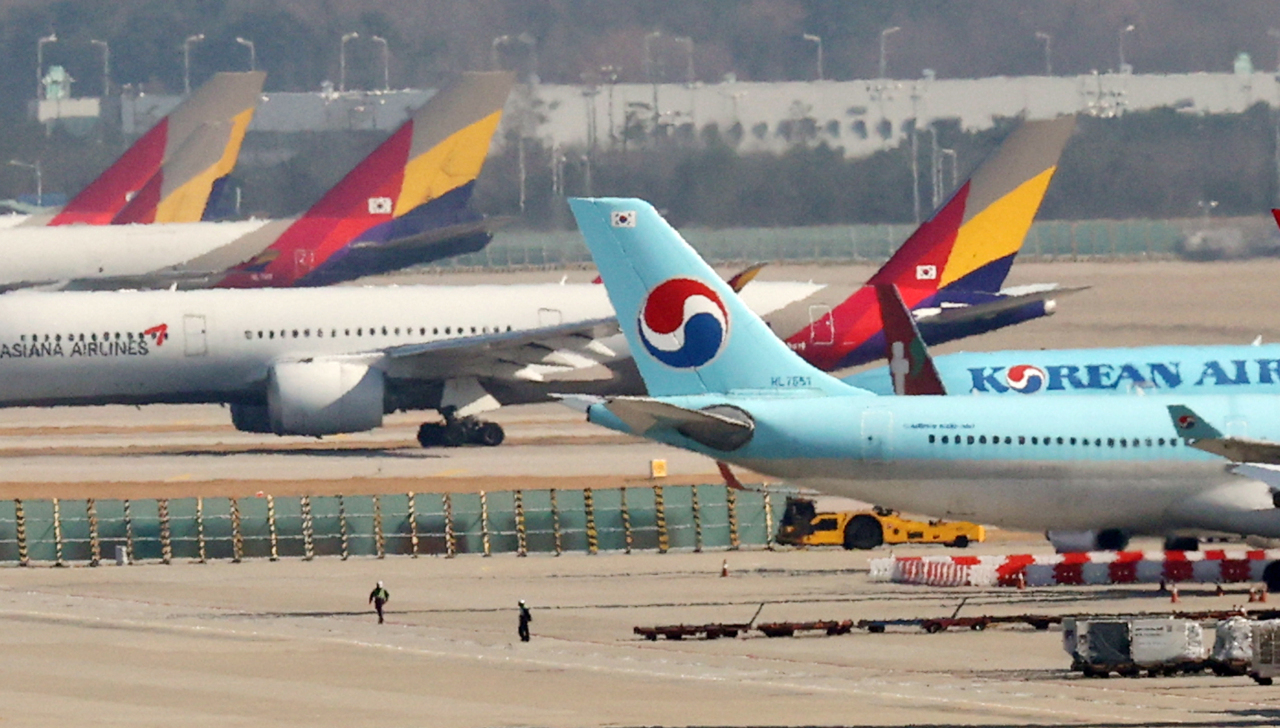Korean Air, Asiana to merge under one brand in 2024: Korean Air president
By Yim Hyun-suPublished : March 31, 2021 - 14:52

Korean Air aims to launch a single integrated entity with Asiana Airlines, its biggest acquisition to date, in 2024, its chief executive president said Wednesday.
Explaining to reporters the post-merger integration plan, which it reported to Asiana’s main creditor earlier this month, Woo Kee-hong said Asiana Airlines would operate as a subsidiary of Korean Air for two years before being integrated into one brand.
“Once Asiana Airlines become a subsidiary of Korean Air, the process to integrate the two will take about two years,” the chief said during an online press conference.
Korean Air, Korea’s largest and the world’s 18th-largest, announced in November plans to buy a 63.9 percent stake in its smaller rival Asiana in a multi-trillion won deal that would create the world‘s 10th-largest airline by fleet size.
The airline is currently in the process of seeking approval from the antitrust bodies of eight countries it operates in after receiving the green-light from the Turkish Competition Authority in February.
It also needs approval from the Fair Trade Commission here, Korea’s regulatory authority for economic competition, as well as a further five countries including the UK and Australia.
Korean Air and Asiana operate a total of three low-cost carriers – Jin Air, Air Busan and Air Seoul.
The state-run Korea Development Bank, the biggest creditor of Asiana, is currently reviewing the integration plan, a process expected to take around a month before confirming it.
Under the latest plan, an option to combine the three low-cost airlines is currently being considered, though whether to operate it under Korean Air or Hanjin KAL, the holding company of Hanjin Group that owns Korean Air, remains undecided.
According to Woo, Korean Air will work for two years to combine the two companies’ systems from aviation safety control to IT and accounting, as well as physically integration the organizations and workforce.
On the issue of potential job cuts, the CEO said the airline plans no layoffs and vowed not to raise flight ticket prices following the acquisition.
“The global air travel industry is a near perfect competition market and raising the prices will be difficult,” Woo said.
“We’ll be working closely with the transport ministry’s airfare monitoring system.”
The marriage, according to Korean Air, will bring about a new economic value worth some 300 to 400 billion won each year once the aviation industry fully recovers from the coronavirus pandemic by streamlining its operations and boasting a wider range of connecting flights.
But the cost of the integration “will not be low,” the airline warned and the benefits will come “two years” after the integration takes place.
When asked about the prospect of a full recovery for the aviation industry, the Korean Air president sounded cautious.
“Countries with high vaccination rates will see domestic air travel demand recover first. But demand for international flights will take some time since countries need to open their borders,” Woo said.
By Yim Hyun-su (hyunsu@heraldcorp.com)
Explaining to reporters the post-merger integration plan, which it reported to Asiana’s main creditor earlier this month, Woo Kee-hong said Asiana Airlines would operate as a subsidiary of Korean Air for two years before being integrated into one brand.
“Once Asiana Airlines become a subsidiary of Korean Air, the process to integrate the two will take about two years,” the chief said during an online press conference.
Korean Air, Korea’s largest and the world’s 18th-largest, announced in November plans to buy a 63.9 percent stake in its smaller rival Asiana in a multi-trillion won deal that would create the world‘s 10th-largest airline by fleet size.
The airline is currently in the process of seeking approval from the antitrust bodies of eight countries it operates in after receiving the green-light from the Turkish Competition Authority in February.
It also needs approval from the Fair Trade Commission here, Korea’s regulatory authority for economic competition, as well as a further five countries including the UK and Australia.
Korean Air and Asiana operate a total of three low-cost carriers – Jin Air, Air Busan and Air Seoul.
The state-run Korea Development Bank, the biggest creditor of Asiana, is currently reviewing the integration plan, a process expected to take around a month before confirming it.
Under the latest plan, an option to combine the three low-cost airlines is currently being considered, though whether to operate it under Korean Air or Hanjin KAL, the holding company of Hanjin Group that owns Korean Air, remains undecided.
According to Woo, Korean Air will work for two years to combine the two companies’ systems from aviation safety control to IT and accounting, as well as physically integration the organizations and workforce.
On the issue of potential job cuts, the CEO said the airline plans no layoffs and vowed not to raise flight ticket prices following the acquisition.
“The global air travel industry is a near perfect competition market and raising the prices will be difficult,” Woo said.
“We’ll be working closely with the transport ministry’s airfare monitoring system.”
The marriage, according to Korean Air, will bring about a new economic value worth some 300 to 400 billion won each year once the aviation industry fully recovers from the coronavirus pandemic by streamlining its operations and boasting a wider range of connecting flights.
But the cost of the integration “will not be low,” the airline warned and the benefits will come “two years” after the integration takes place.
When asked about the prospect of a full recovery for the aviation industry, the Korean Air president sounded cautious.
“Countries with high vaccination rates will see domestic air travel demand recover first. But demand for international flights will take some time since countries need to open their borders,” Woo said.
By Yim Hyun-su (hyunsu@heraldcorp.com)


















![[Today’s K-pop] Treasure to publish magazine for debut anniversary](http://res.heraldm.com/phpwas/restmb_idxmake.php?idx=642&simg=/content/image/2024/07/26/20240726050551_0.jpg&u=)